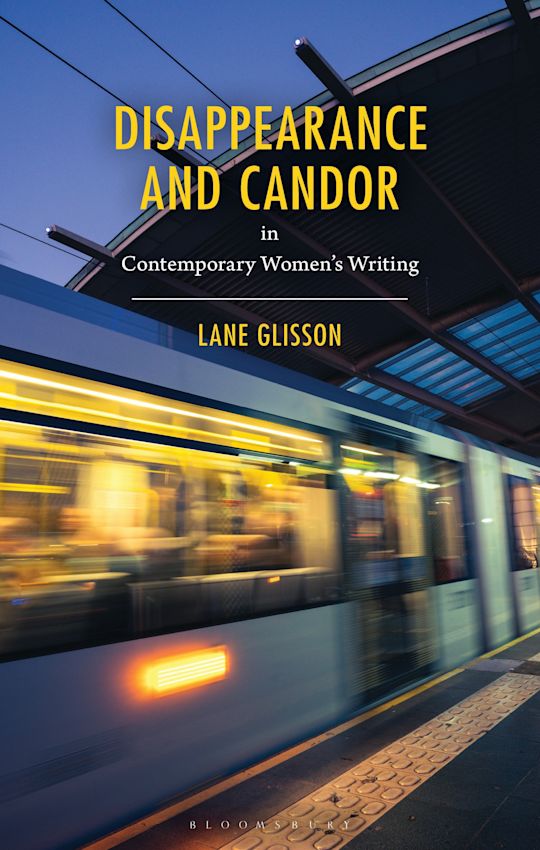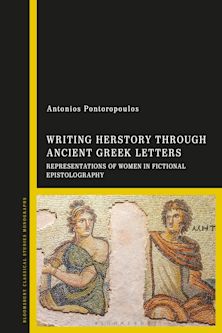- Home
- ACADEMIC
- Literary Studies
- Gender and Sexuality in Literature
- Disappearance and Candor in Contemporary Women’s Writing
Disappearance and Candor in Contemporary Women’s Writing
Disappearance and Candor in Contemporary Women’s Writing
You must sign in to add this item to your wishlist. Please sign in or create an account
Description
Using the example of Marcel Proust's character Albertine, this book argues that the trope of the disappeared woman stems from the male narrator's inability see beyond his own projections; women's narratives challenge those constraints.
Lane Glisson adopts a transnational, comparatist approach to examine the ways that authors Rachel Kushner, Elena Ferrante, Kamala Das, Liliana Heker, and Cristina Rivera Garza diverge from Proust's model to contest the states of disappearance that hinder women. Conversely, she also examines how these authors at times portray disappearance as a strategy of protection from domination or violence, a space to share ideas and create.
Disappearance and Candor in Contemporary Women's Writing examines these works in the context of each author's culture and history, drawing from the writing of philosophers, historians, artists, and activists. In doing so, the author addresses broader questions of human rights by focusing on authoritarian governments' use of gendered language and the feminization of enemies to justify the disappearance of political opponents or scapegoated minorities.
Table of Contents
About the Author
Introduction: The Disappearing Woman
Part One: Imagining the Other
1. Vicious is in the Eye of the Beholder: In Search of Albertine
2. The Unseen Observer: Rachel Kushner's The Flamethrowers
Part Two: Redefinitions
3. The Lady Vanishes: Erasure in Elena Ferrante's Neapolitan Quartet
4. The Freedom to Discompose: The Poetry of Kamala Das
Part Three: Disappearance
5. In Whose Hands? Construction of Testimony in Liliana Heker's El fin de la historia
6. The Enigma of Disappearance: Cristina Rivera Garza's La cresta d'Ilión
Epilogue
Works Cited
Product details

| Published | 08 Jan 2026 |
|---|---|
| Format | Ebook (Epub & Mobi) |
| Edition | 1st |
| Extent | 232 |
| ISBN | 9781978769038 |
| Imprint | Bloomsbury Academic |
| Publisher | Bloomsbury Publishing |
About the contributors
Reviews
-
From Albertine's disappearance in Proust to a range of powerful representations of women's erasure, this book reveals a compelling truth: to be seen, women must be heard. Lane Glisson writes with the same candor she finds in the literature she explores, guiding us on a journey that feels like a quest-for the missing voices of women, and for the meaning of their absence. At once urgent and deeply reflective, this is a book about loss, visibility, and the possibility of desiring and belonging.
Stefania Porcelli, Doctoral Lecturer, Hunter College, USA
-
Disappearance and Candor in Contemporary Women's Writing is a powerful and necessary reexamination of how literature has long punished women who defy patriarchal norms-rendering them mad, silent, or erased. From Paul Bowles's The Sheltering Sky to Elena Ferrante's Neapolitan Quartet, from Kamala Das's lyrical defiance to Cristina Rivera Garza's haunting metafictions, this volume traces how disappearance functions not merely as loss but as strategy: a deliberate act of resistance, refusal, and reinvention.
Through intersectional feminist theory and global case studies-from India to Mexico, from transfeminism to trauma narratives-the essays and creative works in this collection explore how silence and absence can become sites of critical witness, poetic agency, and radical transformation. Whether confronting state violence, gendered silencing, or internalized oppression, the women in these pages do not vanish quietly-they reappear through literary candor, narrative experimentation, and the reclaiming of voice.
A vital contribution to feminist literary studies, with Disappearance and Candor in Contemporary Women's Writing, Lane Glisson redefines erasure not as defeat, but as a generative space for autonomy, subversion, and survival.Simona Wright, Professor of Italian, The College of New Jersey, USA
-
Lane Glisson has written a deeply thoughtful and urgently relevant book. With intellectual rigor and a clear, engaging style, she examines how contemporary women writers confront erasure, violence, and the burden of representation. I admire the transnational breadth of this study and the ethical commitment that animates every chapter. Glisson brings critical clarity to difficult subjects-misogyny, silencing, complicity-and reveals how literature offers refuge and reckoning. This is a timely and necessary work, grounded in feminist ethics and literary precision.
Sophie Maríñez, Professor of Modern Languages & Literatures, City University of New York, USA

ONLINE RESOURCES
Bloomsbury Collections
This book is available on Bloomsbury Collections where your library has access.



































